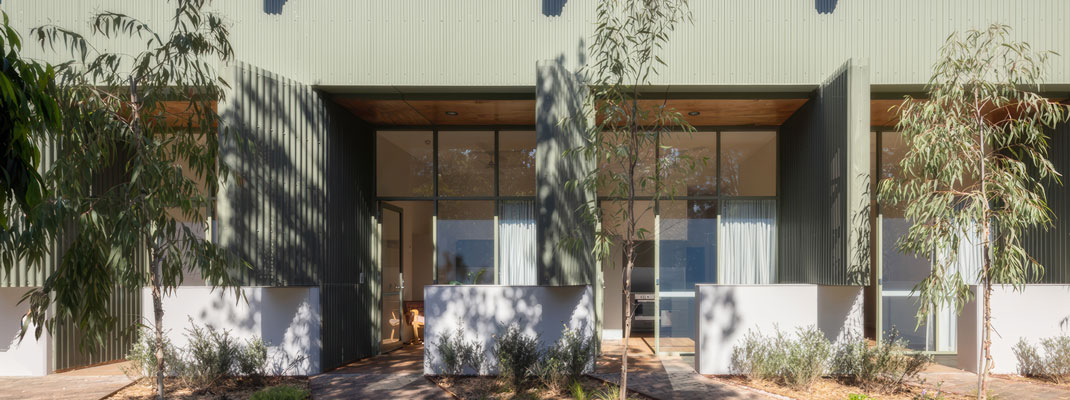By Christine Cheung | Inclusive Places

Christine Cheung is the Principal of Inclusive Places, an access consultancy based in the Northern Rivers region of NSW. A specialist in disability access for over 25 years and an accredited member of ACA, she advocates for inclusion through design. Christine’s work is driven by a belief that good design creates connection and makes spaces better for all.
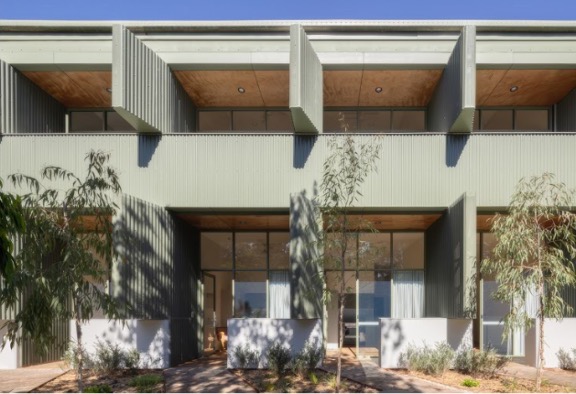
Habilis by Collins and Turner Image: Katherine Lu [Full-width image of units]
A new supported housing project in Sydney’s inner west is reshaping how we think about mental health housing — showing that dignity, safety, and permanence should be the baseline, not the exception.
Winner of the ArchitectureAU award for Social Impact 2025, highly commended in the 2025 NSW Architecture Awards, and a finalist in The Urban Developer Awards (Social Infrastructure category), the project—designed by Collins and Turner for the non-profit Habilis—has transformed a disused industrial site into 20 permanent apartments for people living with schizophrenia. It includes 2 fully wheelchair-accessible units and 15 Improved Liveability units that meet NDIS Specialist Disability Accommodation (SDA) design requirements.
This is a project that puts people before process, access before aesthetics, and community before crisis. Crucially, NDIS funding was the linchpin — helping bring to life an evidence-based housing model that’s not only cost-effective, but life-changing.
The Scale and Smarts Behind the Model
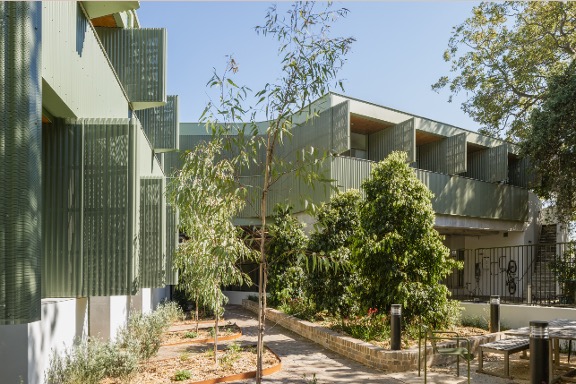
Habilis by Collins and Turner Image: Katherine Lu [Communal area]
While the complex includes 20 units—slightly above the National Disability Insurance Agency’s (NDIA) preferred maximum of 15—it has been intentionally designed at this scale to meet the specific and intensive support needs of people with chronic forms of schizophrenia. Many residents experience significant challenges with motivation, executive functioning, and self-care.
Having 20 residents makes it possible to provide wraparound support services that wouldn’t be viable in a smaller setting: a visiting psychiatrist and mental health nurse, along with two full-time equivalent carers available seven days a week. This level of staffing ensures consistency, adherence to treatment, and continuity of care.
Fifteen of the units are enrolled for residents eligible for NDIS Specialist Disability Accommodation (SDA) funding. This funding stream is central to the model’s viability, enabling residents to pool their supports for shared access to carers and on-site assistance throughout the day. SDA provides a more efficient and targeted funding alternative to individual Supported Independent Living (SIL) packages, which can be administratively burdensome and costlier per person.
As Professor Nielssen explains, this group “ticks every box except they can walk” — highlighting how SDA enables a more appropriate and targeted funding response for people with severe mental illness who require daily support, but not physical assistance.
“Housing is a treatment in and of itself and is the most efficient form of welfare,” said Habilis founder and psychiatrist Professor Olav Nielssen. “Housing has to be permanent and needs to come with basic support to minimise loss of tenancy.”
Grounded in Access. Built for Life.
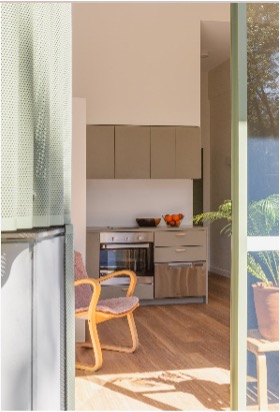
Habilis by Collins and Turner Image: Katherine Lu [Unit entry]
Rejecting the notion of “transitional” housing, Habilis is built on a housing-first philosophy: permanent homes, not stepping stones.
Each unit includes a private kitchen, bathroom, and living space. The development also provides:
- Shared gardens
- A clinic space for visiting health professionals
- A communal room for gatherings and peer connection
The Accessible units are fully compliant with AS 1428.1, offering essential features for independent wheelchair use. The Improved Liveability units are tailored to meet the needs of residents with sensory, intellectual, or cognitive disability—incorporating wide clearances, intuitive layouts, easy-to-use fittings, and strong visual contrast to support autonomy and reduce stress.
Why Design Details Matter
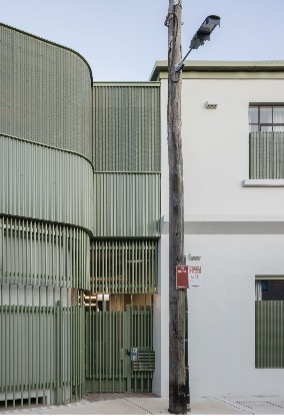
Habilis by Collins and Turner Image: Katherine Lu [Secure Entry]
Informed by mental health professionals and lived experience, every design decision was made with care:
- Privacy screens between balconies to reduce the sense of surveillance
- Soundproofing to protect residents from noise sensitivity
- Secure entry to keep residents safe from external interference
- Open spaces for gardening, gathering, and quiet reflection
“When asked what people with schizophrenia want in a home,” said Nielssen, “pretty much the same things that you and I like — with the proviso that they have to have a balcony to smoke on.”

